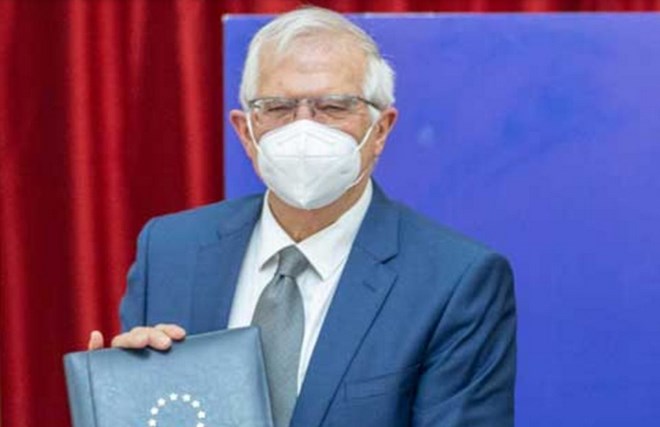
Tuesday February 1, 2022

The European Union is demanding structural changes in the way the successor operation of the African Union Mission in Somalia (Amisom) will work from now on, with emphasis on rebuilding the country’s broken institutions.
Funding
Josep Borrell Fontelles, the EU High Representative for Foreign Affairs and Security Policy, told The EastAfrican that the European bloc agrees that Somalia will be exposed were the Mission to quit without adequate replacement.
But he suggested that the EU will not fund the Mission based on its old structure that focused on combat and troops on the ground with little attention to rebuilding institutions.
Amisom, the African Union counter-terrorism force, was created in 2007 and given mandate by the UN Security Council to operate. But the European Union funds 90 percent of its operational budget.
In 2017, the EU scaled back the funding, citing growing needs to combat terrorism beyond the Horn of Africa.
Transition
The Mission is undergoing a transition with discussions between Somalia and the African Union already settling on an interim operation to help hand over security responsibilities to Somalia security agencies after several years.
In March, the UN Security Council is expected to decide the fate of the Mission, possibly by transforming it to have a wider mandate.
“These efforts, financial effort on one side and military effort on the other, have not given enough results and I think that Amisom has to be reviewed,” Fontelles said in an interview on Saturday.
“We don’t want to abandon Somalia. We don’t want to stop financing Amisom, but we need to review how it works in order to ensure that results are better.”
Kenya, Uganda, Burundi, Ethiopia and Djibouti contribute troops to the Amisom. They had all asked for the transformation into a multidimensional force, which Somalia refused. Somalia also rejected the idea of extending Amisom mandate beyond March.
Last week, the African Union proposed the creation of the African Union Transitional Mission in Somalia (ATMIS) which would have the same mandate as Amisom, but work as a preparatory organisation to help with the transition so that Somalia can take up security duties in two years or so.
It was unclear whether they will continue to send troops.
The ATMIS would have a stronger coherence between troops, something that has lacked in Amisom, including on disciplinary matters.
Peace mission
But the EU is worried that a continual military focus could fail to address the causes of long-term insecurity in Somalia, weak government institutions and few economic opportunities.
“If (Operation) Atalanta ships leave, piracy will come back quickly because the root cause unhappily remains. If Amisom leaves Somalia, Somalia will hardly resist. So we need the effort of the Africans and we need the financial support of the European Union, but it has to be reviewed,” Mr Fontelles said.
“We want an effective mission and we are discussing about it and I hope that we will be able to reach an agreement in order to continue providing this financial support.”
He was also referring to the anti-piracy mission run by the European Union since 2008 in the Somalia sea and the Gulf of Eden and which was formerly known as the European Union Naval Force Somalia (EUNAVFOR).
Somalia has demanded that the operation is stopped so the country can take over the duties of guarding its sea.
Contributors
ATMIS, which will need the approval of the UN Security Council, may not have the same troop contributors as each of the current forces will need to volunteer to join.
The transitional mission will also attract troops from across the continent, although it was unclear if other countries could contribute. In the past, Sierra Leone contributed troops to Amisom but could not replace the forces who had completed their tour of duty when West Africa experienced an Ebola outbreak.
Ahead of the Amisom transition, troop contributors had demanded assurances on funding, suggesting that the UN takes up the cost of operations.
But sources had told The EastAfrican that all the veto-holding members of the Council (France, Russia, UK, US and China) were uncomfortable with such an arrangement as it could open a floodgate of demands to fund similar operations across the world.